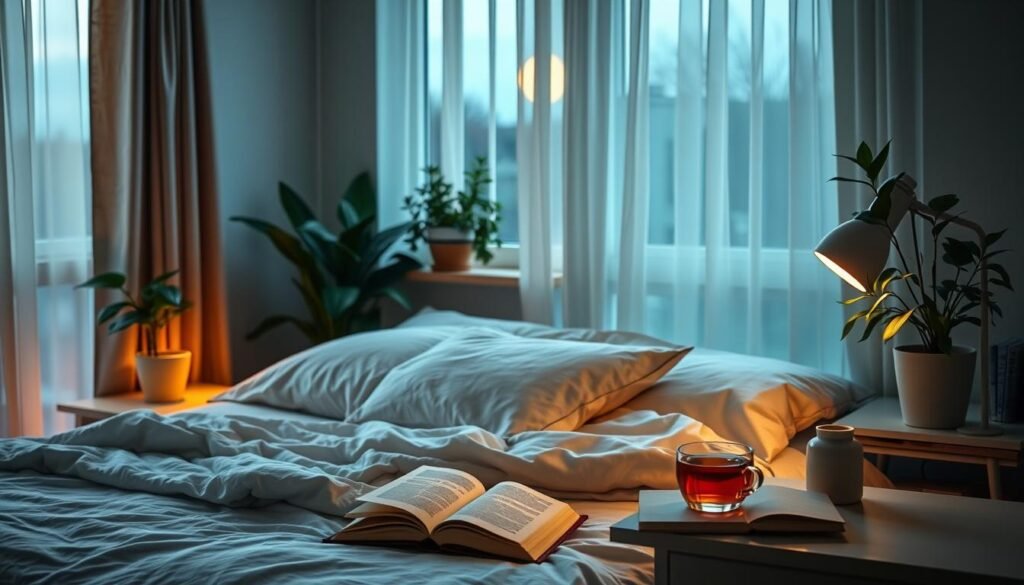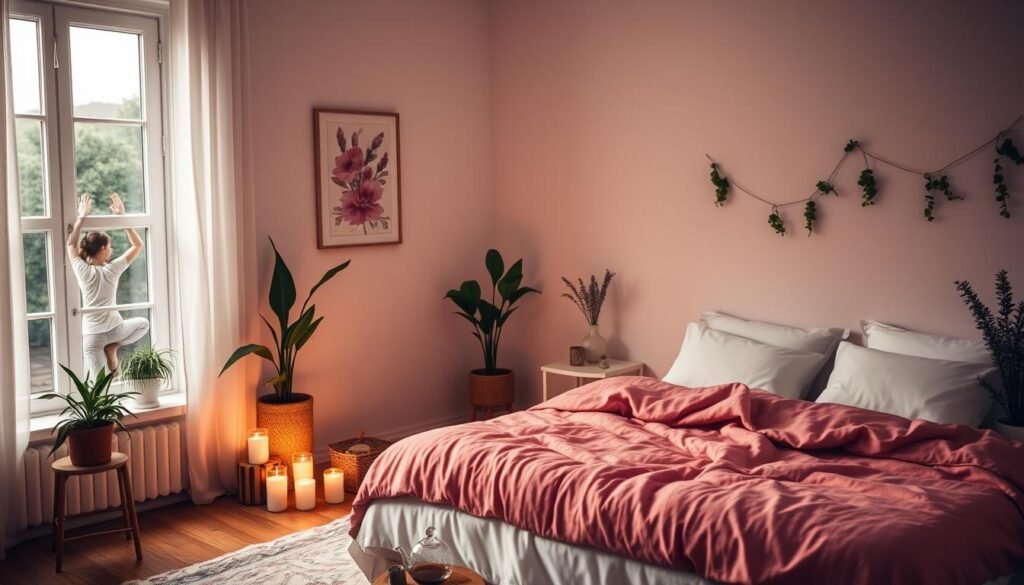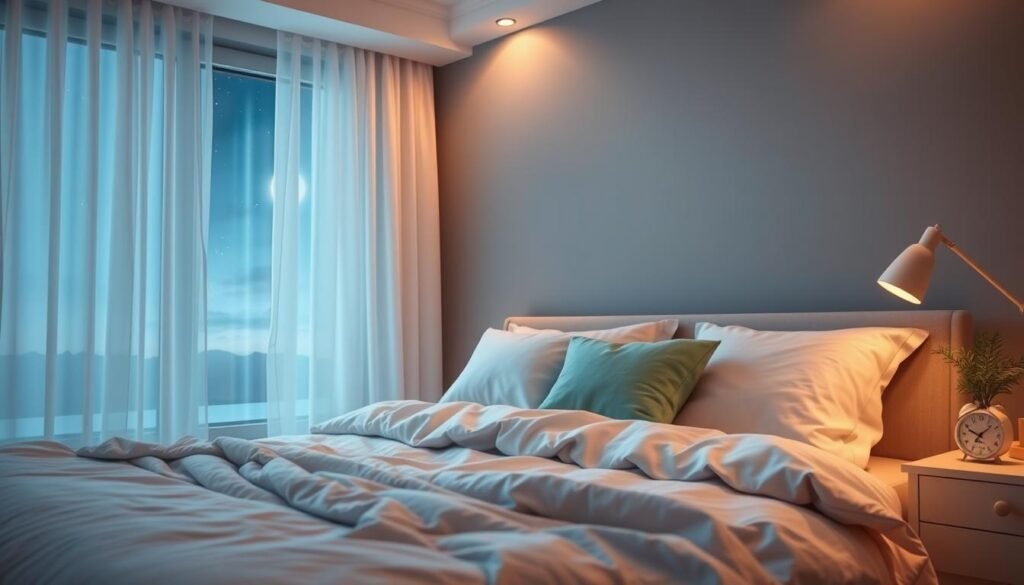Did you know almost one-third of US adults report insomnia symptoms? This fact shows the need for improved sleep habits for better nights and energetic days. Getting enough sleep is key for health, mood, productivity, and life quality. This guide will cover vital strategies to improve your sleep, targeting insomnia.
To achieve better sleep, we’ll talk about optimizing your sleep space and a calming bedtime routine. We’ll also emphasize a regular sleep schedule and managing daily habits for better night rest. Remember, good sleep is crucial for lasting health. For a start, check out sleep hygiene tips at WebMD.
Key Takeaways
- Insomnia affects nearly one in three adults in the U.S.
- Consistent sleep schedules are vital for better sleep quality.
- Bedtime routines can signal to the body that it’s time to sleep.
- A calming sleep environment can minimize disruptions.
- Relaxation techniques can help transition into sleep more smoothly.
Understanding Insomnia and Its Effects
Insomnia is a common sleep issue that makes it hard to fall or stay asleep. It can greatly affect your physical and mental health. People with insomnia may feel tired, grumpy, and struggle to think clearly, impacting their daily lives.
Many things can cause insomnia, like stress, bad sleep environments, and certain habits. Drugs such as temazepam (Restoril®) and zolpidem (Ambien®) might make it worse. Getting the right mental health care is key to sleeping better, as it’s closely linked to our sleep.
The CDC advises getting seven to nine hours of sleep nightly for good health. Not sleeping enough can lead to serious health problems like diabetes and high blood pressure. It can also make it hard to work well, affecting our reasoning, focus, and memory.
Setting a nighttime routine 45 to 60 minutes before bed can help. Doing calm activities and staying off gadgets can make falling asleep easier. Keeping your room cool and dark helps, too.
To understand more about insomnia and improving sleep health, you can check out more information and tips at this resource.
| Medication Type | Examples |
|---|---|
| Benzodiazepines | Estazolam, Quazepam (Doral®), Temazepam (Restoril®), Triazolam (Halcion®) |
| Z-drugs | Eszopiclone (Lunesta®), Zaleplon (Sonata®), Zolpidem (Ambien®) |
| Dual Orexin Receptor Antagonists | Suvorexant (Belsomra®), Lemborexant (Dayvigo®), Daridorexant (Quviviq®) |
| Antiseizure Medications | Gabapentin (Neurontin®), Pregabalin (Lyrica®) |
| Nonprescription Options | Diphenhydramine, Doxylamine |
Sleep Hygiene Tips for Improved Sleep Quality
Good sleep hygiene is vital for better sleep. Healthy habits can greatly improve your night’s sleep. It’s key to have a regular sleep schedule.
Going to bed and waking up at the same time every day helps your body’s clock. This routine boosts your sleep quality over time.
Making your bedroom sleep-friendly is also crucial. A dark, cool, and quiet room makes for ideal sleeping conditions. Keeping the room’s temperature between 60 and 67°F (15.6 and 19.4°C) is best.
Using blackout curtains or eye masks helps too. They block out light, aiding your body’s natural sleep rhythms.
What you eat and drink affects your sleep as well. Avoid big meals, caffeine, and nicotine before bed. Caffeine can disrupt your sleep up to seven hours later. So, watch when you have it.
Eating healthy and at the right times boosts sleep quality. Practice eating mindfully.
Adopting these habits improves your sleep. Making small changes to your routine and where you sleep can help a lot. For more advice on sleep hygiene, check out the Sleep Foundation.
Creating a Relaxing Bedtime Routine
Having a bedtime routine is key to better sleep. A regular sleep schedule tells your body it’s time to relax. Adding relaxation methods before bed can greatly enhance sleep quality.
Importance of Consistency in Sleep Schedule
Keeping a steady sleep schedule keeps your internal clock in check. Adults need 7 to 9 hours of sleep for their best health. Consistent sleep and wake times, along with calming evening activities, reduce stress and aid in relaxation.
Engaging in Calming Activities Before Bed
To get ready for sleep, calming activities are a must. Think about using relaxation techniques such as reading or meditating. Reading can lower stress by 50% in just six minutes. Taking a warm bath, listening to soft music, or journaling are also great for calming down before bed.
Avoid screens an hour before sleep to not mess with your melatonin levels. Try adding a new calming activity weekly to keep your routine interesting and enjoyable.
Optimizing Your Sleep Environment
An ideal sleep environment boosts sleep quality. Room temperature, noise, and light affect our sleep. By improving these, we sleep better at night.
Maintaining an Ideal Room Temperature
A comfortable night’s sleep is best at 65 to 68 degrees Fahrenheit. This helps lower the body’s temperature, promoting rest. Making small adjustments like changing the thermostat or using light bedding improves sleep.
Minimizing Noise and Light Distractions
To sleep better, reduce bedroom noise and light. Blackout curtains help with light, and earplugs or white noise machines with sound. This leads to higher sleep quality. These steps can improve well-being, especially in stressful times, like the COVID-19 pandemic. For more tips, check scientifically-based sleep hygiene advice.

Natural Sleep Remedies to Consider
Looking into natural sleep remedies can greatly better your sleep and overall health. Many find herbal supplements and teas helpful for a restful night. Aromatherapy, especially with essential oils, brings a calming effect that helps with falling asleep faster.
Herbal Supplements and Teas
Herbal supplements are known for their relaxing effects and better sleep quality. Valerian root, chamomile, and passionflower are top choices. Valerian can shorten the time it takes to fall asleep and improves sleep quality.
Researchers say valerian is usually safe for up to six weeks, with few side effects like headaches or a mild “hangover” feeling.
Chamomile has anti-inflammatory and anti-bacterial qualities that help with relaxation. Teas with chamomile or tart cherry juice are great before bed. They’re safe and don’t carry the side effects of sleep meds.
Essential Oils for Relaxation
Essential oils are key in aromatherapy for sleep. Lavender and chamomile oils, in particular, create a restful sleep environment. Using these oils in your bedroom can promote better sleep. Lavender’s scent, for example, helps in making a calming bedtime routine.
| Herbal Remedy | Benefits | Usage Duration | Side Effects |
|---|---|---|---|
| Valerian Root | Reduces time to fall asleep, improves quality | Up to 6 weeks | Headaches, mild “hangover” feeling |
| Chamomile | Calming, aids relaxation | No specific limit | Rare allergic reactions |
| Passionflower | Benzodiazepine-like calming action | No specific limit | Sleepiness, confusion in some cases |
| Lavender Essential Oil | Promotes relaxation, enhances sleep environment | No specific limit | Skin irritation for some individuals |
Effective Relaxation Techniques for Better Sleep
Many adults struggle with chronic insomnia, often due to stress and anxiety. These issues make it hard to fall and stay asleep. By using good relaxation techniques, you can sleep better and manage stress well.
Deep breathing exercises are a great way to begin. The 4-7-8 breathing pattern is one such technique. You breathe in for four seconds, hold it for seven, and exhale over eight seconds. This method helps your body relax and encourages better sleep.
Then there’s Progressive Muscle Relaxation (PMR). It involves tensing and then relaxing your muscles in a specific order. Pairing PMR with yoga nidra, a type of meditative yoga, can make you feel more relaxed. It uses mental images and awareness of the body to improve sleep.
Non-sleep deep rest (NSDR) is another method to consider. It focuses on relaxing while you’re awake. NSDR can refresh your energy and enhance memory. This is especially helpful for those who find it hard to relax.

Below, a table highlights different techniques for relaxation and better sleep management:
| Technique | Description | Benefits |
|---|---|---|
| Deep Breathing | Involves controlled inhalation and exhalation. | Reduces anxiety and increases oxygen flow. |
| Progressive Muscle Relaxation | Systematic tensing and relaxing of muscle groups. | Leads to physical relaxation and reduces stress. |
| Yoga Nidra | Guided meditative practice for relaxation. | Helps achieve deep relaxation, improving mental health. |
| Non-Sleep Deep Rest (NSDR) | Focused practice for conscious relaxation. | Restores energy and boosts cognitive functions. |
| Visualization | Imagining peaceful scenes to relax. | Improves mental relaxation and lowers stress. |
Making these techniques part of your bedtime routine can really help you sleep better. For those not wanting to use sleeping pills, these methods are a great choice. Adding good sleep habits to these practices increases your chances of restful sleep.
Diet and Its Impact on Sleep Quality
An individual’s diet directly affects how well they sleep. Bad eating habits often disturb our sleep. Meanwhile, choosing the right foods can help us sleep better. Knowing what foods to avoid is key for those looking to sleep more soundly.
Foods to Avoid Before Bedtime
Being careful with what you eat before bedtime is crucial. Some foods disrupt sleep patterns and are best avoided. Here’s what to keep in mind:
- High-sugar snacks, like candies and pastries, can mess with your energy levels.
- Drinking caffeine or alcohol two to three hours before bed harms sleep quality.
- Heavy, spicy, or fatty foods can cause acid reflux, leading to discomfort.
- Avoid skipping meals or eating late at night, as it can upset your internal clock.
Mindful Eating Practices for Better Sleep
Mindful eating benefits your health and improves sleep. To sleep better, consider these tips:
- Stop eating a few hours before bed to help with digestion and reduce discomfort.
- Eat a balanced diet with good carbs, proteins, and fats for better sleep.
- Include foods high in tryptophan, like turkey, cheese, and kiwi, to enhance sleep.
- Watch your portion sizes. Overeating can disrupt your sleep.
Eating mindfully and making smart diet choices can improve your sleep quality. For additional information on how health issues might affect sleep, check out this resource.
Incorporating Physical Activity for Better Rest
Getting regular exercise is key to improving sleep quality. Studies show a strong link between workouts and better sleep. It’s important to exercise at the right time to boost sleep benefits.
Timing Your Exercise for Optimal Sleep
To sleep better, think about when you exercise. Working out too late can keep you awake. It’s advised to finish intense exercises 3 to 4 hours before sleep.
This gives your body time to calm down. It helps you enjoy deeper sleep.
Gentle Exercises to Consider Before Sleep
Evening routines can include light exercises. Yoga and tai chi are perfect for relaxing before bed. They ease stress and get you ready to sleep.
Doing 30 minutes of activities like brisk walking every week can enhance sleep. Over time, people tend to sleep 15 more minutes each night.
| Type of Exercise | Benefits for Sleep | Recommended Timing |
|---|---|---|
| Vigorous Cardio | Increased melatonin production | At least 3-4 hours before bedtime |
| Gentle Yoga | Promotes relaxation and reduces stress | 1-2 hours before bedtime |
| Tai Chi | Improves tranquility and calm | 1-2 hours before bedtime |
| Moderate Aerobic Exercise | Improves overall sleep quality | Variable timing based on individual preference |
Making time for physical activities can greatly enhance sleep. For those with sleep problems, regular exercise improves mood and sleep. It’s about finding what fits into your life.
Utilizing Sleep Tracker Apps for Insight
Sleep tracker apps are essential for those looking to better their sleep. They offer features that help users monitor their sleep closely. This allows users to understand their sleep patterns and quality better.
About 35% of Americans have tried a sleep-tracking device, with 77% finding them useful. Around 68% changed their habits based on the sleep data they received. This shows the positive effect of sleep tracker apps.
Smartphone ownership went up from 35% to 77% between 2011 and 2017. Now, more than 26% of U.S. adults use their phone or a wearable device to track sleep. This increase shows more people understand the value of monitoring their sleep.
Below is a comprehensive table that outlines various features of popular sleep tracker apps, showcasing their functionalities and benefits:
| App Name | Main Features | User Rating |
|---|---|---|
| Sleep Cycle | Smart alarm, detailed analysis, sleep sounds | 4.8/5 |
| Pillow | Wearable integration, heart rate monitoring, sleep insights | 4.7/5 |
| Sleep Score | Sleep scoring, personalized advice, sleep coaching | 4.6/5 |
| Calm | Meditation, relaxation music, sleep stories | 4.8/5 |
| Fitbit | Wearable tracking, exercise integration, sleep trend analysis | 4.5/5 |
Exploring sleep tracker apps can change how you view sleep. They help identify and fix poor sleep patterns. This leads to a more restful night’s sleep.
Insomnia Improved Sleep Habits: A Path to Restful Nights
Improving sleep habits can greatly improve your sleep. Adults need around 7 to 9 hours of sleep each night. Knowing this helps spot the value of good sleep habits.
To tackle insomnia, we must look at its causes. These might be stress, anxiety, or bad sleep setups.
Good sleep hygiene is key. A consistent sleep schedule and a sleep-friendly space are crucial. Avoid big meals, caffeine, and alcohol before bed.
These changes, plus regular exercise, boost sleep quality. Yet, avoid heavy workouts close to bedtime.
Relaxation methods help fight insomnia too. Lowering lights and noise makes your room a calm space. Also, cool it down for better sleep.
Trying a digital detox before bed helps too. Cutting electronics helps prepare you for sleep.

If insomnia sticks around, get professional help. Sleep coaches look at your sleep habits and life. They tailor tips for better sleep and well-being.
Working with a pro can improve how you manage insomnia. This leads to better sleep habits for life.
Conclusion
The path to better sleep starts with knowing how complex insomnia is and its effect on our minds. Tips on beating insomnia show us how to sleep better. By making your sleep area calm, improving sleep habits, and using relaxation methods, you can get into a good sleep routine.
It’s key to remember that about one out of three people deal with insomnia. So, it’s important to follow these steps. Better sleep does not just help us rest well—it also improves our mental health. This can affect our moods and how we deal with stress. By making these changes, you can greatly improve your overall well-being.
Anyone can fight against insomnia by sticking to these methods. Good sleep is crucial because it helps with our emotional balance and general health. With some dedication, restful sleep can be a goal you can achieve.